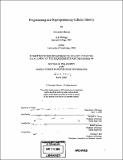Programming and reprogramming cellular identity
Author(s)
Marson, Alexander
DownloadFull printable version (25.45Mb)
Other Contributors
Massachusetts Institute of Technology. Dept. of Biology.
Advisor
Richard A. Young and Rudolf Jaenisch.
Terms of use
Metadata
Show full item recordAbstract
Every cell in the human body contains the same genetic information, with few exceptions, yet each cell type enacts a distinct gene expression program to allow for highly specialized functions. These tightly controlled programs are the results of transcriptional regulation, by transcription factors and chromatin regulators, as well as post-transcriptional regulation, mediated in part by microRNAs (miRNAs). Additionally, cells must respond to external cues, and signal transduction pathways converge on gene regulatory machinery to shape cellular identity. The work presented here focuses on the mechanisms by which transcription factors, chromatin regulators, miRNAs and signal transduction pathways coordinately regulate two particular medically important gene expression programs: (1) the program that controls pluripotency in embryonic stem (ES) cells, giving these cells the capacity to differentiate into every adult cell type, and (2) the program that allows regulatory T (Treg) cells to prevent autoimmunity by suppressing the response of self-reactive conventional T cells. Genomic investigations of the core regulatory circuitry of each of these cells types presented here provide new insight into the genetics of pluripotency and autoimmunity, and suggest a strategy for reprogramming based on chemical manipulation of the cellular programs that control cell identity.
Description
Thesis (Ph. D.)--Massachusetts Institute of Technology, Dept. of Biology, 2008. Includes bibliographical references.
Date issued
2008Department
Massachusetts Institute of Technology. Department of BiologyPublisher
Massachusetts Institute of Technology
Keywords
Biology.